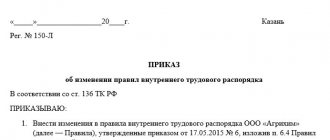Delay of wages from the legal point of view
The procedure and timing of settlements with employees are regulated by Art. 136 Labor Code of the Russian Federation. According to parts 5 and 6, the salary must be issued directly to the employee at the location of the enterprise or transferred to a bank account. The frequency of payments is at least once every 15 days. Accordingly, the employee must receive two or more payments each month.
The norms of the Labor Code of the Russian Federation do not determine the percentage of payments. Therefore, one of them may be larger in size than the other. For example, the system for paying employees may be as follows: the first payment includes only the salary at the tariff rate, and the second, in addition to the salary, includes bonuses and other additional payments.
Specific dates for payment of wages, in accordance with Part 4 of Art. 136 of the Labor Code of the Russian Federation, are determined in the collective labor agreement for all employees equally or are stipulated directly in the contract with each employee. Moreover, if the payment date falls on a weekend or holiday, then the calculation is made the day before.
For individual payments, special deadlines may be established within which the administration of the organization must make them. So, for example, vacation pay, according to Part 9 of Art. 136 of the Labor Code of the Russian Federation, are transferred to the employee no later than three days before the start of the vacation.
Accordingly, if an enterprise does not comply with these requirements and pays the employee at the wrong time or does not pay the due money at all, then we are talking about delayed wages.
Responsibility for delayed wages lies in the application of financial and other sanctions to the administration of the enterprise in accordance with the norms of the Labor Code, Code of Administrative Offenses and the Criminal Code of the Russian Federation - depending on the timing and amount of accumulated debt.
If necessary, you can go to court to collect wages.
https://youtu.be/l-Rgq6cXJjI
Delay of wages
Delay of wages means failure to pay them within the time limits established by law or local regulations. Art. 136 of the Labor Code of the Russian Federation (LC RF) provides:
- Payment of wages at least every 1/2 month. In this case, the payment date is established by a local act of the organization and must contain specific numbers, and not a time period. The final payment of wages must be made no later than the 15th day of the month following the month being paid.
- Issuance of vacation pay no later than 3 days before the start of the vacation.
- Establishing other deadlines for making payments. Yes, Art. 140 of the Labor Code of the Russian Federation requires full payment to be made when dismissing an employee on his last working day.
Among the common reasons that contribute to the delay in payment of wages are:
- lack of funds in the employer’s bank account;
- incorrect application of legislation, expressed in the establishment of payments once a month, floating dates for the payment of wages, etc.;
- violations committed by employees of the organization, such as untimely execution of personnel documents or failure to transfer funds by an accountant on time;
- failure of equipment and programs both at the employer and at the servicing bank, etc.
Material and administrative responsibility
The first sanction applied to the administration of an organization is financial liability under Part 1 of Art. 236 Labor Code of the Russian Federation. For each day of delay in payment of money to the employee, interest is charged on the amount owed. Starting from the day following the day on which wages are due and ending with the day the debt is actually repaid.
Important! The amount of interest is determined by Part 1 of Art. 236 of the Labor Code of the Russian Federation and is 1/150 of the key rate of the Central Bank of the Russian Federation for each day of delay.
The second sanction that an employer must be subject to for delaying wages and other payments due to an employee is a fine, defined in Art. 5.27 Code of Administrative Offenses of the Russian Federation. When brought to administrative responsibility, the period of delay and the amount of unpaid wages on time do not matter. That is, to qualify the actions of an organization as an administrative offense, a delay in payments of one day is sufficient.
The amount of the fine for non-payment of wages depends on whether the employer committed the violation for the first time or repeatedly within a year. For first-time violators of Art. 136 of the Labor Code of the Russian Federation regarding the timing of settlements with individual entrepreneurs, the amount of the fine under Part 6 of Art. 5.27 of the Code of Administrative Offenses of the Russian Federation will range from 1 to 5 thousand rubles, for organizations - 30 to 50 thousand.
If an individual entrepreneur or organization has repeatedly accumulated salary debt during the year, the amount of the fine for unpaid wages will be greater and will amount to 10 to 30 thousand rubles for individual entrepreneurs, and from 50 to 100 thousand for organizations (Part 7 of Article 5.27 Code of Administrative Offenses of the Russian Federation).
The ConsultantPlus system has many ready-made solutions, including information about what happens if wages are delayed. If you don't have access yet, you can get it for free on a temporary basis. For further use of the system, obtain the current K+ price list.
Delay of wages for 1 day: consequences under the Labor Code
According to the Labor Code of the Russian Federation, a delay in wages even for 1 day entails mandatory payment of monetary compensation. Its size cannot be lower than 1/150 of the key rate established by the Bank of Russia. The calculation is made for each day from the moment when the wage arrears arose until the day when it was actually repaid.
It is the employer's responsibility to calculate the interest and pay it along with the debt itself, and this does not require the employee to take any action, such as writing a statement. In this case, there is no need to prove the employer’s fault. Even delays that occurred due to an error by the servicing bank or a technical failure in the operation of equipment or software must be compensated.
Art. 236 of the Labor Code of the Russian Federation provides for the minimum amount of compensation for delayed wages. It can be increased by a local act of the enterprise, as well as a collective or labor agreement.
Calculation example
The delay period was 5 days.
The key rate is 6.25%.
The amount of delayed wages is RUB 20,000.
The amount of compensation will be equal to: 20,000 × 6.25% / 150 × 5 = 41.67 rubles.
Employee rights when wages are delayed
Norms Art. 142 of the Labor Code of the Russian Federation gives the employee the right to independently seek payment of the due salary by suspending work. However, this right can only be used if the salary delay is more than 15 days.
Important! To legally begin the suspension of work, the employee must notify the employer about this in writing (Part 2 of Article 142 of the Labor Code of the Russian Federation). The corresponding application (notification) can be submitted to a representative of the administration either in person against a signature or sent by mail, with a list of the contents and a receipt.
If the employee complies with the stipulated requirement of written notification to the enterprise, then disciplinary sanctions cannot be applied to him (for example, dismissal for absenteeism). In addition, the employee retains his average salary for the entire period of suspension of activities. This obligation of the enterprise is another measure of the employer’s liability for non-payment of wages.
At the time of suspension of work, the employee is not required to be present at the workplace (Part 3 of Article 142 of the Labor Code of the Russian Federation). However, he is obliged to go to work the next day after receiving written notification from the enterprise of his readiness to repay the debt on the day he goes to work.
According to Art. 142 of the Labor Code of the Russian Federation, not all employees have the right to suspend work. Thus, if an employee is employed in the sphere of life support for the population (ambulance, heating, water and gas supply enterprises, etc.), he does not have the right to suspend work due to the specifics of his professional activity.
Criminal punishment and the peculiarities of its application
The most severe measure of liability for non-payment of wages on time is the application of criminal punishment under Art. 145.1 of the Criminal Code of the Russian Federation. This provision presupposes the presence of two independent elements of a crime. Thus, for Part 1 to apply, two conditions must exist:
- Salaries are paid partially for three or more months in an amount less than half of what the employee is entitled to.
- The reasons for incomplete payment are the selfish interest of the employer. That is, if an enterprise cannot pay its employees in full due to objective reasons, for example, there is simply no money in its accounts and there is no way to replenish them, then it is impossible to bring the management to criminal liability.
The penalty for this act varies from a fine to 120 thousand rubles to a year in prison.
To use Part 2 of Art. 145.1 of the Criminal Code of the Russian Federation it is necessary that:
- the enterprise did not pay wages at all or paid less than one minimum wage per month;
- the debt period exceeded two months;
- the reason for the debt is the employer’s self-interest.
The severity of the sanctions in this situation will be greater: a fine of up to 500 thousand rubles or imprisonment for up to three years.
If, in the presence of any of the specified parts 1 or 2 of Art. 145.1 of the Criminal Code of the Russian Federation, if additionally serious consequences occur, for example the death of a person, then the employer will face a fine of up to 500 thousand or imprisonment for up to five years.
Features of bringing to criminal liability for non-payment of wages
In Art. 145.1 of the Criminal Code of the Russian Federation also has a note that allows the management of the enterprise to avoid a fine or imprisonment. If the committed act did not entail serious consequences, was committed for the first time and within two months from the date of initiation of the criminal case the debt to the employees was fully repaid, the guilty person is released from liability under this article.
Where to go if wages are not paid on time
Let's consider where to go if wages are delayed. There are several government agencies that can help an employee in this situation. Firstly, the employee has the right to file a statement of violation of his rights with the labor inspectorate at the location of the debtor organization.
In a document drawn up in any form, you should indicate:
- your data;
- name, address and other contact details of the employer;
- period of delay and amount of debt.
The labor inspectorate will conduct an unscheduled inspection of the organization and, if the facts specified in the application are confirmed, will issue an order to eliminate the violation, i.e., will order the employer to pay the employees.
If there is an administrative offense, she can hold the employer liable under clause 6 of Art. 27.1 of the Administrative Code or draw up a protocol with subsequent transfer of materials to the court for prosecution under clause 7 of Art. 27.1 Code of Administrative Offences. Such powers of the labor inspectorate are established in paragraph 1 of Art. 23.12 and sub. 16 clause 2 art. 28.3 Code of Administrative Offences.
Read more about the procedure for bringing to administrative liability in the article Proceedings in cases of administrative offenses.
Results
Thus, in Russia there is a clear system of sanctions for non-payment of wages, the severity of which is determined by the timing and size of the debt to employees.
Sources:
- Labor Code of the Russian Federation dated December 30, 2001 No. 197-FZ
- Code of the Russian Federation on Administrative Offenses
- Criminal Code of the Russian Federation dated June 13, 1996 No. 63-FZ.
You can find more complete information on the topic in ConsultantPlus. Full and free access to the system for 2 days.
Penalty for delayed wages in 2020
Clause 6 Art. 5.27 of the Code of Administrative Offenses of the Russian Federation (CAO RF) provides for administrative liability:
- in case of partial or complete non-payment of wages;
- setting wages below the level provided by law;
- the absence of a criminal offense in the employer’s actions, which we will consider in detail below.
The Code of Administrative Offenses of the Russian Federation establishes liability for late wages in the form of a fine. Its value will be:
- 10,000–20,000 rub. for authorized officials;
- 1,000–5,000 rubles when the employer, an individual entrepreneur (IP), was at fault;
- 30,000–50,000 rub. for enterprises.
In addition, paragraph 7 of this article provides for more stringent liability when the offense was committed by a person who had previously been punished under paragraph 6. In this case, the fine will increase:
- up to 30,000 rub. in relation to individual entrepreneurs;
- 100,000 rub. for legal entities;
- 30,000 rub. for officials, who may also be subject to disqualification for up to 3 years.








